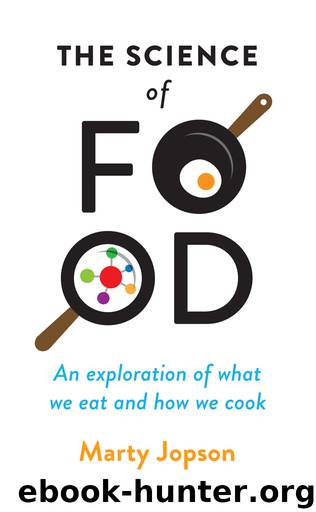The Science of Food by Marty Jopson

Author:Marty Jopson
Language: eng
Format: mobi, epub
Publisher: Michael O’Mara
Published: 0101-01-01T00:00:00+00:00
Chocolate from pod to bar.
The chemical often hailed as being responsible for this is the somewhat confusingly named theobromine. The confusion comes because it contains no bromine, just carbon, nitrogen, oxygen and hydrogen. Its name is derived from the Latin for the cocoa plant, Theobroma cacao, which in turn gets its name from the Greek for god (theo) and food (broma). Chocolate is literally the food of the gods. From a pharmacological perspective, theobromine acts a bit like caffeine. Consequently, it increases your heart rate, but also makes your blood vessels relax and thus reduces blood pressure. Like caffeine, it also causes an increase in urination and can prevent you from getting to sleep. It’s hard to imagine, but it is possible to overdose on chocolate and get too much theobromine in your system, at which point you will suffer nausea and vomiting. Humans have it easy though, as we are very good at breaking down theobromine. Some animals cannot break it down. Dogs, for example, can easily suffer from theobromine poisoning. The drug will stay within their blood for hours and as little as 60 grams of chocolate per kilogram (about 1 oz per lb) of the dog’s body mass can be lethal. Interestingly, theobromine is dangerous to cats, too, but poisoning is rarely seen as, unlike dogs, cats cannot taste sweetness and have little incentive to eat chocolate in the first place. While there is no doubt that if you eat a big block of dark chocolate, rich in theobromine, there will be an effect on your body, there is nothing about the substance that makes it addictive.
For that, there are two other possible suspects we should consider. The first is an amino acid, a building block of proteins, called tryptophan that is used by our bodies to manufacture another drug known as serotonin. This is secreted in our brains to give a feeling of well-being and happiness. This sounds like a good candidate for the addictive nature of chocolate. Unfortunately, the most recent studies show that while an increase of tryptophan in your brain does give rise to an increase in serotonin, this does not happen if you just eat the stuff. Tryptophan is sent to your brain through a special amino-acid transporter. The problem is that when you eat chocolate you ingest a whole pile of different amino acids and these effectively block up the amino-acid transporter. The end result is that chocolate does not increase the levels of tryptophan in the brain.
The only other suspect to explain chocoholism is phenethylamine, a naturally occurring chemical found in many plants that is probably being produced by the plant to act as an antimicrobial agent. On its own, phenethylamine is a psychoactive drug and within the drug industry it has been used as a starting point for the manufacture of a whole range of compounds, including psychedelics, anti-depressants, stimulants, anti-anxiety drugs and, somewhat randomly, a range of decongestants. But once again, the chemicals within chocolate are foiled by our own bodies.
Download
This site does not store any files on its server. We only index and link to content provided by other sites. Please contact the content providers to delete copyright contents if any and email us, we'll remove relevant links or contents immediately.
Thing Explainer by Randall Munroe(3327)
The Elements by Theodore Gray(2432)
Make by Mike Westerfield(1971)
The Meaning of it All by Richard Feynman(1909)
Science Experiments You Can Eat by Vicki Cobb(1447)
Every Tool's a Hammer by Adam Savage(1442)
The Perfectionists by Sara Shepard(1426)
Raspberry Pi Electronics Projects for the Evil Genius (Tab) by Norris Donald & Norris Donald(1384)
Martin Gardner's Science Magic by Martin Gardner(1352)
Hands-On Genetic Algorithms with Python by Eyal Wirsansky (2020) by Unknown(1273)
The Perfectionists by Simon Winchester(1271)
Elephants on Acid: And Other Bizarre Experiments by Alex Boese(1249)
Synchrotron Light Sources and Free-Electron Lasers by Eberhard J. Jaeschke Shaukat Khan Jochen R. Schneider & Jerome B. Hastings(1236)
Elephants on Acid by Boese Alex(1234)
Handbook of Modern Sensors by Jacob Fraden(1225)
Tesla by Carlson W. Bernard(1183)
The Science of Food by Marty Jopson(1166)
The Meaning Of It All by Richard P. Feynman(1125)
125 Physics Projects for the Evil Genius by Silver Jerry(1119)
